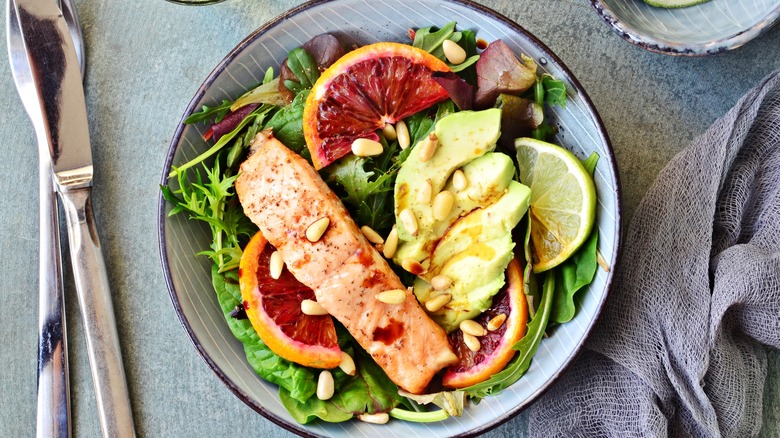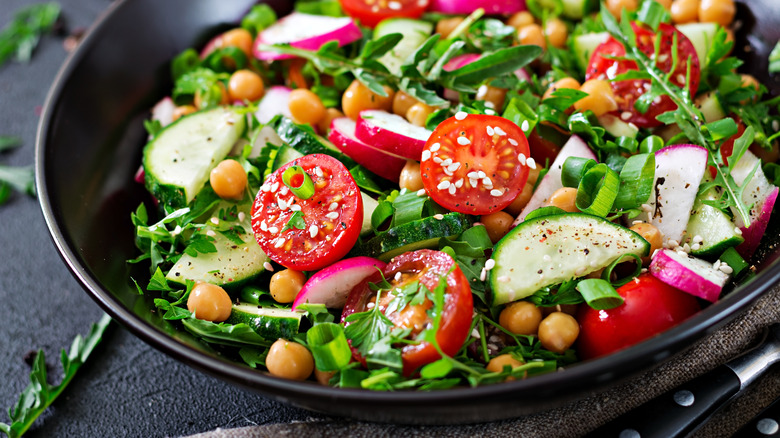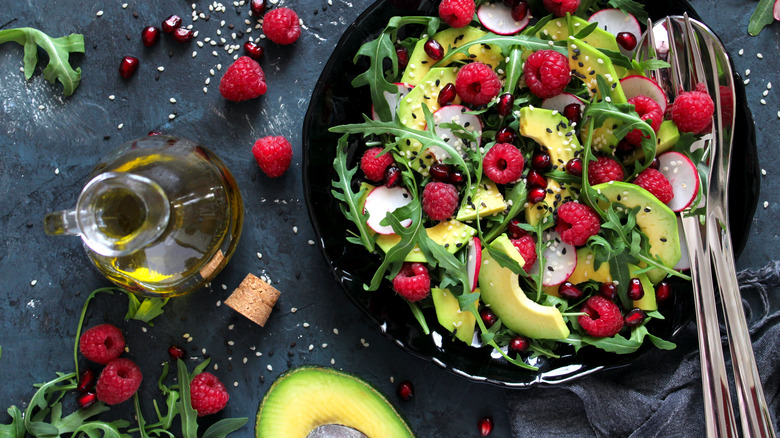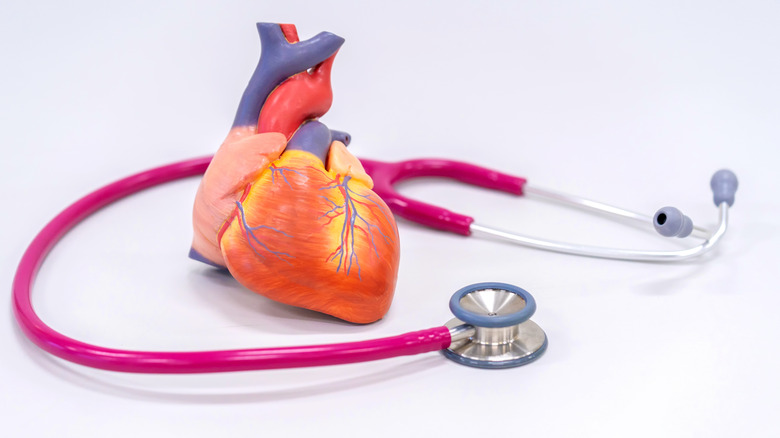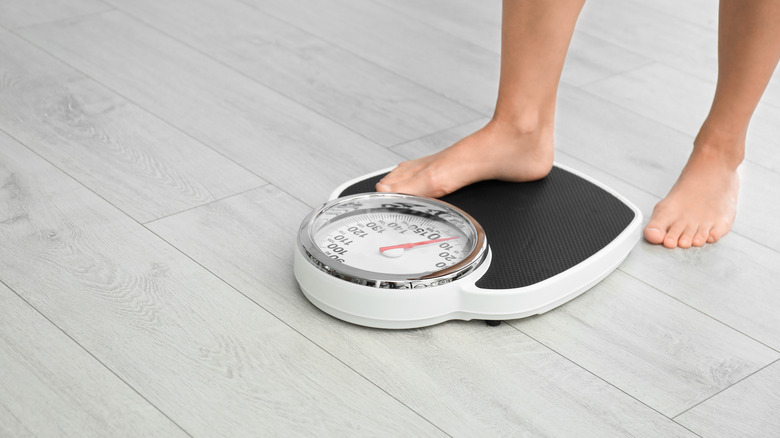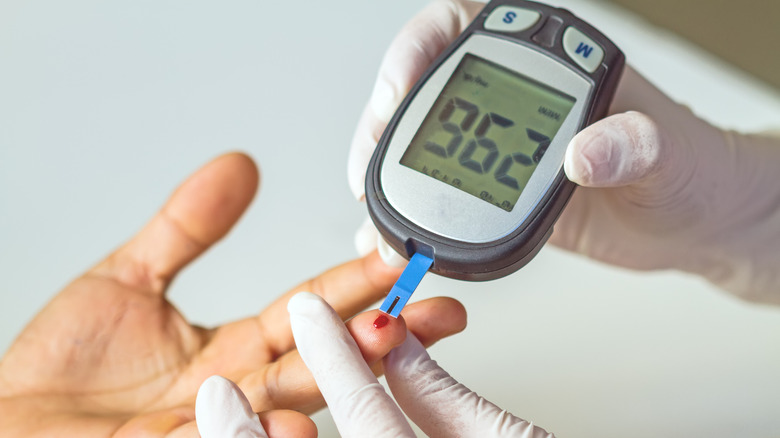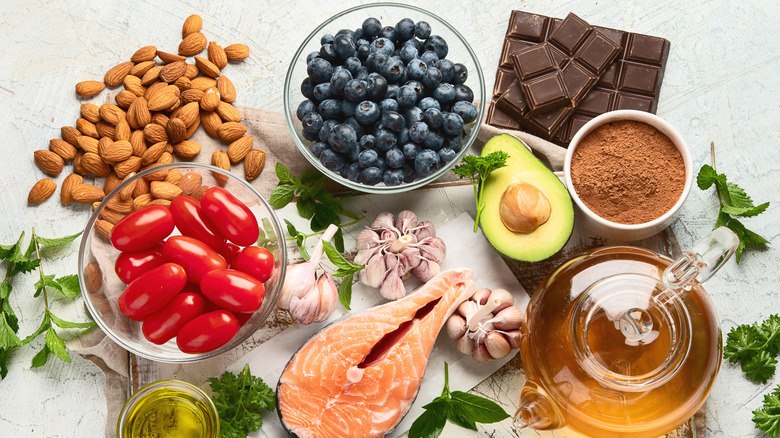When You Eat Only Salad Everyday, This Is What Happens To Your Body
Salad is the one dish that most likely comes to mind when you think about healthy eating. After all, what could be better for you than leafy greens and crunchy vegetables accompanied by a nice lean protein?
We're not talking about your grandmother's salad either, with only iceberg lettuce, a few shreds of carrots, and stale, square shaped croutons out of a bag. Rather, this is salad 2.0, with lots of fresh, dark greens, a diverse array of colorful vegetables, lean proteins like grilled salmon or a well-seasoned chicken breast, complex carbs like quinoa, and a tasty dressing that's not loaded with unhealthy fats. Bring on the avocado, chickpeas, and sunflower seeds, too!
When you have a well-balanced salad that hits all of your nutritional needs, do you really need anything else on the menu? Well, if you've found that you've hit your stride by eating only salad every day, you might be surprised to learn just how healthy it is for you. So read on to find out what happens to your body when you have a healthy salad for all three meals. Just be sure to avoid everything that makes your "healthy" salad unhealthy.
You'll add healthy fats to your diet if you eat only salad every day
It used to be that conventional wisdom told us to avoid eating fat at all costs, as it's just downright bad for us. But according to Dr. David Ludwig, a professor of nutrition at Harvard School of Public Health, that was not the best approach. "We've focused on fat reduction for 40 years, and it's sent us in exactly the wrong direction in terms of obesity and diabetes," he shared in an interview with Time.
So when you're making your salads, be sure to add some healthy fats to it, which are good for your health, according to Jamie Hickey, a certified personal trainer and nutritionist. "A couple tablespoons of raw or roasted seeds like pumpkin, sunflower, and ground flax or chia will boost your intake of good fats," he told The List. "Different types of dressings will help you too — just make sure to use the oil-based brands." That ensures you're not accidentally consuming saturated fat, which isn't healthy for you, according to the American Heart Association.
Avocado, salmon, and nuts are also good sources of healthy fat, according to Heart & Stroke.
You'll increase your fiber intake if you eat only salad every day
It may be a little bit taboo to talk about, especially at the dinner table, but ensuring that you're getting enough fiber in your diet is super important. Fortunately that's something that eating salads can help with, according to Andrea Berez, a registered dietitian. "You will become more regular because you are eating a high-fiber diet," she told The List. "Eating fiber-rich foods helps move the contents of the large intestine along more quickly. The RDA for fiber is 25g/day for women and 38g/day for men. One should increase fiber gradually or risk abdominal discomfort and bloating." So be mindful of what your intake is, and make sure you're balancing it properly with other foods.
In particular, foods to include in your salad with lots of fiber are green peas, broccoli, turnip greens, quinoa, brown rice, split peas, lentils, and beans, according to the Mayo Clinic. The more you change it up, the less boring it will be, too.
Eating only salad every day helps lower your blood pressure
According to the CDC, in 2013, more than 360,000 people passed away with high blood pressure being a contributing factor. So if you're someone who has high blood pressure, eating lots of salads might be a great idea for you, according to Kristen Carli, a registered dietitian. "You will likely see a decrease in blood pressure," she told The List. "Increased plant consumption is associated with a decrease in blood pressure. Those with high blood pressure are often counseled by a registered dietitian to increase their consumption of vegetables and decrease their consumption of animal products."
So in order for you to reap those benefits, you have to be careful about what you put in your salad. For one, you can't overdo it on the sodium, according to Healthline, so salty foods like lunch meat should be avoided in favor of less processed foods. Additionally, make sure your salad has foods like leafy greens, beets, berries, unsalted seeds, and pistachios to get your blood pressure into a super healthy range. Makes sense, as salads make up one option healthy people eat for lunch.
Your muscle performance will improve if you eat only salad every day
Make no mistake about it: Dark, leafy greens are super good for your body. So if you're filling up your salad bowl with them regularly, you're going to notice that your muscle performance is improving, according to certified personal trainer and nutritionist Jamie Hickey. "Maybe Popeye knew what he was talking about," he quipped. "The nutrients found in spinach and other greens not only help to build strong bones, they also help to improve the performance of mitochondria — little structures inside our cells that help to produce energy, as well as inform and power our muscles." That can certainly make leg day at the gym a whole lot easier, for sure.
Additionally, if you're looking to build muscle mass, there's a wide variety of ingredients that you can include in your salads to help, including eggs, salmon, edamame, shrimp, chickpeas, tofu, almonds, cottage cheese, quinoa, and tuna, according to Healthline. That leaves a lot of room for variation, too!
Your cholesterol levels will decrease if you eat only salad every day
According to Healthline, it's important that you carefully monitor your cholesterol levels to make sure you're within a healthy range. To that end, doctors advise that you don't consume too many saturated fats, trans fats, and added sugars, all of which can increase your "bad" LDL cholesterol levels. While foods high in these ingredients may taste good, they cause your liver to produce excess cholesterol, and that's not good for you.
If you're a salad fiend, however, and you're careful about the ingredients you include in your dishes, you're likely to have lower cholesterol levels, according to registered dietician Andrea Berez. "Your cholesterol will drop because you are increasing your fiber intake," she explained. "Soluble fiber can reduce both 'bad' LDL and overall cholesterol by binding with cholesterol particles in the digestive system and moving them out of the body. Other cholesterol friendly foods you can add to your salad include legumes, avocado, and berries."
Your digestion will improve if you eat only salad every day
In addition to helping you get your daily recommended dose of fiber, eating salads can improve your overall digestive health as well, according to Heidi Moretti, a registered dietitian. "You will feel better digestion, especially from foods like carrots, broccoli, radishes, celery, cilantro, and more," she told The List. "These foods support healthy antioxidants, which balance out toxins in the gut." That's two reasons that your intestines will thank you for your salad-happy ways.
Additionally, if you're playing your cards right, salads provide you with other elements that keep your colon in tip-top shape. "Most salads have a good balance of nutrients, like fibers and vitamins, that also help fuel the digestive cells," she continued. "Salads also often have probiotic foods on them, such as aged cheeses, apple cider vinegar, or yogurt, which help support a happy belly." And a happy belly means a happier you.
Eating only salad every day will help protect your heart
Are you concerned with your cardiovascular health? Does heart disease run in your family? If so, eating lots of salad could be the right move for you, according to nutritionist Jamie Hickey. "Romaine lettuce contains two key nutrients in significant levels that help to protect the heart muscle, folate and fiber," he revealed. "High levels of folate have been shown to assist in the prevention of stroke and cardiovascular disease." Plus romaine packs a great crunch. And who doesn't want to follow at least some ways to make your heart healthier.
Romaine lettuce isn't the only heart healthy food that you can find in a salad, either. For one, fish like salmon and tuna and seeds like flaxseeds and chia seeds are high in omega-3s, which are good for your heart, according to the Cleveland Clinic. Healthy nuts will also protect your ticker, as well as legumes like kidney, garbanzo, and pinto beans. And if you want to add a little sweetness to the mix, berries and fruits can both bring the flavor and boost your cardiovascular health.
You'll have more energy if you eat only salad every day
Are you someone who eats lots of carbohydrates and high fat foods? Do you find yourself crashing out fairly often, unable to make it through the day? If so, switching to a diet with lots of salad in it might help you regain the spring in your step, according to registered dietician Kristen Carli. "By eating a salad composed of non-starchy vegetables, healthy fats, and a source of protein, you are consuming a low glycemic meal that will supply a steady stream of energy to your body instead of the common energy crash associated with an unbalanced meal," she shared. Sounds like a real relief!
So if you're aiming to specifically eat a low-glycemic diet, be sure to load up your salad with apples, peaches, berries, beans, and fish, according to Harvard Medical School. Add healthy fats like almonds, walnuts, pecans, and avocados in measured amounts, and avoid trans fats altogether. Lastly, make sure any carbs that you're eating are in their natural state, like millet, brown rice, and barley. Then dig in!
Eating only salad every day will help you handle stress better
Believe it or not, but a whopping 79 percent of Americans report feeling stressed out sometimes or frequently during their day, according to a Gallup poll. That means that eight out of every ten people in the United States are worried about some aspect of their life, which is a staggering statistic.
Well, if you're looking to lower those stress levels via your diet, eating a lot of salad might just be a great idea for you, according to registered dietician Heidi Moretti. "Your body will be able to handle stress better because of the balance of protein and minerals," she explained. "Proteins, vitamins, antioxidants, and fats in salads are essential in forming our balancing hormones in our bodies." She added that protein is the building block for our neurotransmitters, which have the power to keep us focused and calm.
Of course, salad isn't going to fix all of your problems, but it might help you handle them just a little bit better.
Want to lose weight? Try eating only salad every day
Let's face it: losing weight isn't easy for the majority of people, according to U.S. News & World Report. For one, foods that are bad for us taste good, such as processed sugar, processed carbs, and high-fat foods. It doesn't help that these foods are widely available in seconds at a variety of fast food restaurants like McDonald's and Burger King, either.
But that doesn't mean losing weight is impossible, especially if you're mindful of what you're eating on a day-to-day basis. And since salads are by nature heavy on the veg, eating a lot of them might be a great way to shed unwanted pounds, according to Kristen Carli, as registered dietician. "Because this nutrient-dense balanced meal also happens to be lower in calories, it is likely you will also see weight loss," she revealed. "Being at a calorie deficit will lead to weight loss, but since you are eating vegetable-packed meal, you will likely not be lacking any necessary vitamins and minerals." That certainly sounds like the right way to do it!
Eating only salad every day can lower your blood sugar levels
According to the CDC, over 100 million Americans have diabetes or prediabetes, which is a lot of people. So if you're within that statistic, chances are you're monitoring your blood sugar levels — and having lots of salads can help with that. "Having a daily salad can affect blood sugar levels in more ways than one," registered dietician Bonnie Balk shared. "If made correctly, the actual salad itself could be free of (or low in) added sugars and full of high-fat items, if it is void of creamy dressings, candied nuts, salty cheese, and fried croutons."
So what should your salads contain instead? "If your salad contains fresh or roasted vegetables, whole grains, proteins, and a home-made dressing, the calorie, sugar, fat, and sodium contents are bound to be on the lower end," she continued. "Not only that but by choosing a salad as a meal, you're likely declining other high sugary meal options." Just prepare for what happens to your body when you cut out sugar. Spoiler: You'll feel better because eating too much sugar can really mess with you.
You'll get a wide variety of vitamins and minerals if you eat only salad every day
It's important to make sure that you get the right amount of vitamins and minerals in your diet, according to the National Institutes of Health. To that end, eating salad is a great way to do just that, according to Amanda A. Kostro Miller, a registered dietitian. "You can get a wide variety of vitamins and minerals," she told The List. "Salads can be a mixing pot of nutrients, a well-rounded salad having 4+ food groups in one meal!"
Additionally, Miller noted that salads can contain other beneficial ingredients. "If your salad is colorful from fruits and veggies, you can get a great antioxidant profile since different antioxidants come from different-colored fruits/veggies," she continued. "If you have healthy fats from oil-based dressings and/or fatty fish, you can get heart-healthy fats." Miller also suggested mixing up your proteins, switching between plant-based and animal-based sources, in order to diversify your amino acid profile.
You'll feel more satiated if you eat only salad every day
You might be tempted to think that salads are skimpy meals that will leave you hungry all the time. But if you're balancing your ingredients properly, that's simply not the case, according to Bonnie Balk, a registered dietitian. "Although you may not view salads as a 'hearty meal,' they can be more satiating than many other food choices," she told The List. "Besides the vegetables, if your salad includes a protein and complex carbohydrate, it has the key nutrients that promote feelings of satiety and prevent you from overeating." She stressed that portion control is essential, so don't go crazy with the quinoa.
That satiated feeling is mostly thanks to our good friend, fiber. "Mainly, the fiber found in the vegetables, beans, and whole-grains (i.e. brown rice, quinoa, etc.), absorbs water and remains in the stomach longer, thereby creating a feeling of fullness," Balk continued. "The more fiber-filled meals you have, in addition to protein and healthy carbohydrates, the less likely you are to overeat at your next meal."
But wait! Eating only salad every day might not be the best idea
While there are very clearly lots of benefits you reap from eating salad every day, nearly every expert we spoke to expressed concern about the lack of food variety you'd get eating only salad every day. In fact, eating only salad can have some consequences, according to Catherine Devlin, a licensed clinical psychologist. "Restricting your eating to one type of food, like salad, creates a deprivation effect," she told The List. "When we are deprived of variety, we are more vulnerable to over-eating. When I see clients eat salad every day, they start to crave heavier foods and generally feel out of control when they do decide to eat these foods." She added that this can lead to weight cycling, which isn't good for your heart.
To that end, you would benefit from more diversity in your diet, according to registered dietician Heidi Moretti. "This is especially true if you live in a cold climate," she explained. "It is probably best to serve your salad with a nice cup of warm chicken and vegetable soup in this case." Variety is the spice of life, after all!

